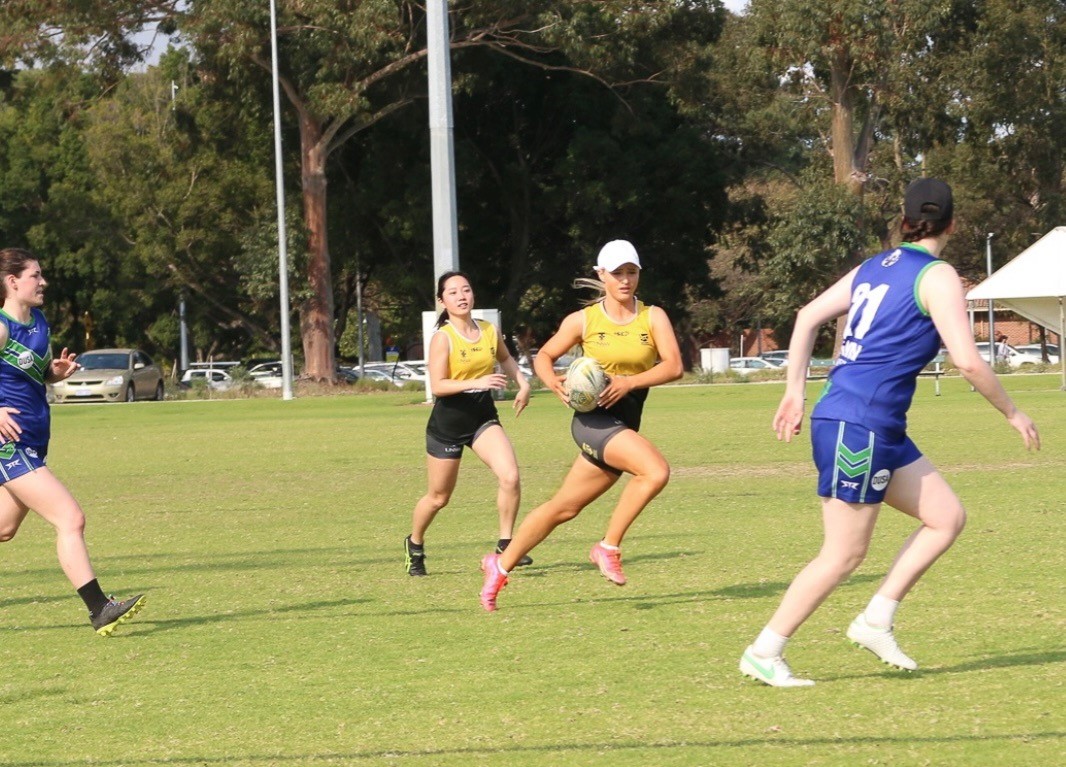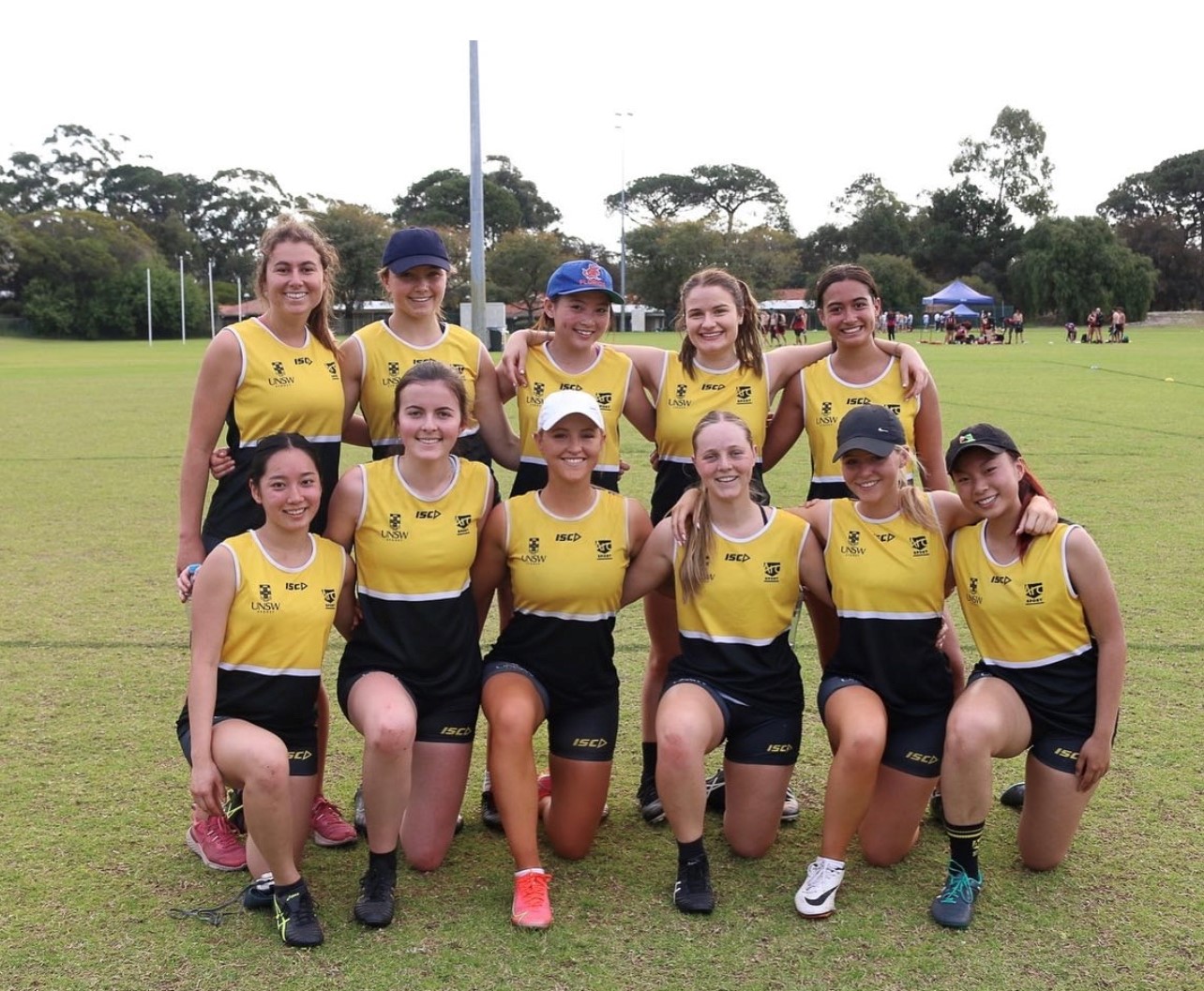Elite Athlete Spotlight: Emily Thomson
Paving the Way for Indigenous Representation in Rural Australian Sports
Paving the Way for Indigenous Representation in Rural Australian Sports

In a recent interview with Emily Thomson, a proud Wiradjuri woman hailing from the sacred Wiradjuri country of Parkes, NSW, we delved into her remarkable achievement of receiving the first UNSW Touch Football Leadership Award. Emily's journey, marked by dedication and perseverance, bringing light to the importance of indigenous representation in sports and supporting indigenous communities whilst promoting cultural competency within the healthcare system.
The UNSW Touch Football Leadership Award holds a special place in Emily's heart. Emily describes the award, saying, "it is a huge step for promotion of sports and study within the rural indigenous communities”. Growing up on Wiradjuri country, Emily's passion for both academics and sports flourished. Originally a tennis player, Thomson was unable to continue during her junior years of high school due to the unforgiving nature of shin splints. This setback in her life gave her more opportunities to focus on her academics. Inspired by her mother and Nan, who are both nurses, Emily developed a keen interest in the medical field. Witnessing the healthcare challenges faced by her community, such as staff shortages and long waiting times, she felt compelled to address the health inequities prevalent in rural and Indigenous communities across Australia. Now in her 5th year of Medicine at UNSW Emily one day hopes to return to her roots and serve as a doctor in rural and remote areas, starting with Dubbo in 2025.

Growing up in Parkes, Emily's childhood was intertwined with the love for touch football. She participated in local competitions, Junior State Cup events, and school galas. These experiences not only nurtured her athletic skills but also allowed her to forge connections and build friendships with people all over the country. Touch football became more than just a game for Emily; it became a platform for personal growth, mental well-being, and community engagement.
The UNSW Touch Football Leadership Award was made possible through the initiative of Christian Frost, multiple donors, and a group of like-minded individuals who recognized the importance of inspiring young athletes in the sport. The award aims to promote touch football within rural and indigenous communities offering them a chance that they may not have had in the past.
The financial assistance provided by the scholarship has been instrumental in supporting Emily's touch football journey. The grant of $5,000 covers touch fees, uniform expenses, and travel costs associated with competitions and training. Touch football is not just a game but a commitment that requires time, effort, and financial resources. The scholarship eases the burden, enabling Emily to focus on her athletic pursuits and balance them with her university studies.
Emily's dedication to touch football goes beyond personal achievements. She aspires to become a leader and advocate for greater indigenous representation in sports, particularly in rural Australian towns. Emily acknowledges the challenges faced by athletes from marginalized backgrounds and seeks to break barriers and create opportunities. The scholarship has provided her with a platform to initiate conversations, raise awareness, and organize networking events centred around themes such as women in touch football and mental health. Emily states "I see this award as a platform to raise awareness about the importance of mental health in sports and to encourage more conversations around the topic”.

Beyond her academic pursuits, Emily is a passionate athlete and coach. She actively participates in touch football, netball, tennis, field hockey, and league tag football. Her coaching journey has seen her work with diverse groups, including the All-Abilities Touch Football team in Bankstown and the Under 14s Boys Bankstown Representative Team. Additionally, Emily serves as a university Sports and Wellbeing Advocate, refereeing weekly social sport competitions and assisting Nura Gili in organizing Indigenous sporting events.
As a Student Ambassador for the Nura Gili Indigenous Support Unit at UNSW, Emily plays a pivotal role in mentoring and guiding future Indigenous students. She actively leads programs like the Youth Leaders Program and Indigenous Preparatory Programs, facilitating pathways into tertiary education for Indigenous youth. She mentions how grateful she is for the opportunity saying “"Luckily for me, I'm also a student ambassador of Nura Gili, so that means working with the future students’ team to get young Indigenous kids into Uni." Emily's commitment to supporting her community extends to obtaining her Indigenous Mental Health First Aid Certificate, delivering Cultural Safety talks, and volunteering for various initiatives like the Souths Cares program. She mentions “a lot of those students that I mentored came and tried out for the Indigenous national team this year, and I think three of the students that I had made it into the team… which is an incredible feeling watching their growth”. Emily showcased her talents earlier this year leading the touch football team at her 4th Indigenous Nationals.

Looking ahead, Emily's aspirations extend beyond the sport of touch football. She envisions expanding the reach of the scholarship, allowing more aspiring athletes to benefit from its support. With the hope of increased funding and resources, Emily aims to pave the way for future generations, empowering them to pursue their sporting dreams without limitations.
It is tough to fathom where she gets the time to do all of this, as a recipient of the UNSW Touch Football Leadership Award, she has not only proven her worth on the field but also demonstrated her commitment to making a difference.
Congratulations Emily!
Donors for the UNSW Touch Football Leadership Award: Christian Frost; Jarrat Wood; Chris Wang; John Mouawad; Christopher Jonson; Daniel Rushworth; Anthony Nader; Gurmesh Singh; Jamieson Chan; Inshan Sheriff; Philip Birrell.